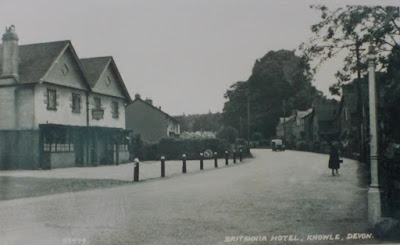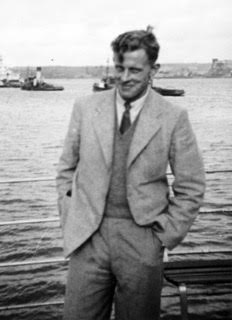Dog & Donkey wave Good Bye to Britannia

Knowle Village's local as it looked when I arrived in the area eight years ago. It had two pub signs: 'Britannia Inn' on the wall and 'The Dog and Donkey' on the car park
The old 'Britannia Inn' sign: still there... but maybe not for long
The Britannia Inn, we’re told in Fairlynch Museum’s local history records, was the oldest institution in Knowle. It was older than the Village Hall and older by at least 20 years than the former church of St John which stood on Dalditch Lane, and which is listed as being built in 1893. The church was converted into a private residence in around 2013.
I use the
past tense because it seems at last that the Knowle pub will be officially
known by the name used by generations of locals following its recent purchase from
Enterprise Inns by publican Nick Stiling.
From an
incomplete collection of Budleigh Salterton street directories we can date The
Britannia’s origins to within 15 years. In 1857 it was not mentioned, but one
Samuel Knowles was listed as a ‘beer retailer’. In 1873, however, he was
recorded as landlord of The Britannia.

The photo was taken when William Bastin was innkeeper at The Britannia between 1901 and 1906. The car bears the name Tozer of Otterton. A copy of this photo, lent by Jack Gooding, is in Fairlynch Museum archives
After Samuel Knowles, the name of Henry Fulls appeared in the 1883 directory. This was followed by John Sanders in 1889, and William Bastin in the 1901 and 1906 directories.
In 1923
Charles Doney was listed as the landlord; the Doney family would remain on the
premises until at least 1988. According to an article of 2 October 1997 in the
Budleigh Journal, quoted in Fairlynch Museum records, Charles Doney, better
known as Charlie, delivered coal in the village with a donkey cart accompanied
by his dog, hence the nickname of The Dog and Donkey.
However in a
later version of the story, published in an edition of August 2000, the
Journal stated that the pub’s nickname
had originated during World War One and that it was Charlie Doney’s wife
Florrie who had delivered coal. With the men away, and presumably through the
consequent lack of business, she had started a coal delivery business using a
donkey and cart for the deliveries, followed everywhere by her dog.

How The Britannia used to look: from a picture lent by Mr Grimshaw to Fairlynch Museum
The most obvious change to the pub in the post-WW1 era was not the name but the appearance of the new building which arose in 1926, replacing the traditional cob and thatch building. In common with many houses and particularly pubs of the 1920s and 30s the new style Britannia had Mock Tudor elements, including leadlight casement windows in diamond panes at the front. Is there also perhaps an Alpine influence? ‘A bizarrely nice exterior’, reads one recent comment on an online pub appreciation site. ‘It looks like an Austrian cottage - with its gables and flowers - it just needs the Von Trapp family singers!’
Foreign influences in local architecture can indeed be
seen in the area, like the ‘Alpine appendages’ of The Cliff, Dr Brushfield’s house in Budleigh Salterton.

Image courtesy Jack Gooding, from a photo at Fairlynch Museum
According to the Journal report of 2 October 1987, on Charlie Doney’s death in 1959, Florrie took over the licence. The pub, according to this postcard of 1962, was known as The Britannia Hotel.
Ten years later in 1972 The Britannia passed to their daughter Olive
Doney. She ran the pub for over 20 years, and then in 1994 handed it over to
Caroline Willcock, a relative who had been associated with The Britannia all
her life.

An undated report in Fairlynch Museum’s local history records, probably published in 1997, carries this uncredited photo of Caroline and her husband Kenneth. It described how the pub had been completely refurbished, with ‘a spacious new light and airy function room, complete with self-contained bar, modern skittle alleys, pool table, darts and ample seating’. The report concluded: ‘The former tap room has been converted into a snug, cosy room and the 1920s lounge has been restored to its former glory’.

An undated report in Fairlynch Museum’s local history records, probably published in 1997, carries this uncredited photo of Caroline and her husband Kenneth. It described how the pub had been completely refurbished, with ‘a spacious new light and airy function room, complete with self-contained bar, modern skittle alleys, pool table, darts and ample seating’. The report concluded: ‘The former tap room has been converted into a snug, cosy room and the 1920s lounge has been restored to its former glory’.

Three years later, the August 2000 edition of the Budleigh Journal carried the news that the Britannia’s new owners, Yvonne Patterson and Ian MacFarlane had decided to change the pub’s name from The Britannia to The Dog and Donkey.
For much of
its life, the pub had been a free house. However at around this time it was
bought by the West Midlands-based Enterprise Inns.
In 2006 ex-Marine Richard Steer and his wife Bea, pictured here, took over the pub after moving from Surrey. They established it as a reliable eating-place offering, as they said ‘fresh and top quality unpretentious food, beautifully cooked with great attention to detail’, using local ingredients wherever possible.
But the early
years of the 21st century were marked by a decline in the UK pub
trade and proved to be an unhappy time for The Dog and Donkey. Richard and Bea Steer moved on and the pub
remained closed for a time.
The shortest tenancy
ended on 1 January 2012 when Martin and Cate Allway locked the doors on their
last day at the pub and were apparently made homeless after failing to make a
go of the business. They had bought the lease ten months earlier from
Enterprise Inns for a reported £49,950.

Jeff White with partner Kate and her daughter Aisha
The Dog and Donkey remained sadly empty for months until Jeff White and his partner Kate Knight took it over in 2012, having persuaded Enterprise Inns to splash out on a refit. Retired Royal Artillery Major Jeff had previously run a pub on Exmoor. Keen to rebrand The Dog and Donkey, he decided to go back to its original name having consulted Fairlynch Museum’s archives.
This new pub sign for The Britannia was chosen by Jeff White
‘The pub started off as The Britannia back in Victorian times so we thought it was only right to respect its heritage and discover a bit more of its past’, he said. He was looking forward to restoring the Britannia as Knowle's local while providing restaurant meals that were quite a bit more ambitious than the average pub's.
‘We are really passionate about providing honestly
good Devon food with excellent customer service’, said Kate. ‘All our food is
locally sourced and we're finding that our customers appreciate dishes that are
a bit out of the ordinary.’
As well as changing the name, the couple also changed
the tap room into a village shop. Race Nights, Community Suppers and even ‘Fawlty
Towers’ and ‘Allo, allo’ evenings were held at the pub.
However various difficulties arose and by December
2015 Jeff and Kate had moved on and the Britannia had been bought by local
publican Nick Stiling. It had been on the market for some time, and the new
owner is now able to run it as a free house once more.
Nick, who is also landlord of the Salterton Arms on
Chapel Street in Budleigh Salterton and who gained his taste for running pubs
at The Feathers, which his parents used to run, has also decided to change the Britannia’s
name back to the Dog and Donkey!
Ukulele Nights, previously held with great success at ‘The
Salt’ will now be held on Mondays at ‘The Dog’.

The Knowle pub will be run by manager Fred Boodoo, who like Nick, knows the area well. Originally from the Seychelles, he has lived in Budleigh for 12 years and also worked at one time at The Feathers.

The new pub sign, based on this picture which hangs above the fireplace, ignores the issue of whether it was Charlie or Florrie Doney who drove that donkey cart back in the early days.
I look forward to seeing the new sign installed. It may have an element of fantasy about it, but it marks a fresh start for a well known landmark in the village and I’m all for an imaginative approach to an enterprise. Maybe the dog should be playing the ukulele rather than smoking that pipe.






Comments
Post a Comment